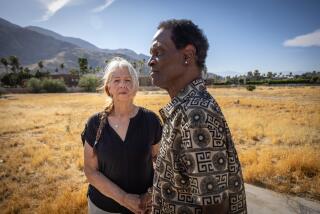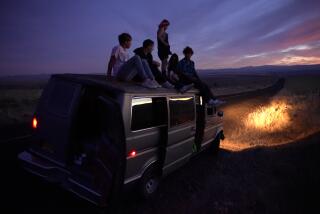REUNIONS : Rainbow Family Has Coloradans on Alert : A loose-knit peace group has pitched camp near Paonia, and residents are far from pleased.
PAONIA, Colo. — “It’s a beautiful day in Rainbowland, eh?” says Detour as he enters the Popcorn Palace. Several large blue tarps crowned with flags surround a smoking fire pit. Tony plays “Blackbird” on his guitar and Firestarter cradles Forest Moon, the baby he helped deliver at last year’s Rainbow gathering.
A half-mile farther through the woods, Hobbit stirs oatmeal at the Quit-Yer-Bitchin’-Love-Light Kitchen. “Welcome home,” he says. “Free food, free love, free smoke.”
This isn’t People’s Park. It’s the Gunnison National Forest, just outside Paonia, a coal-mining and fruit-growing town, population 1,400, in western Colorado. Against a backdrop of remote, snowy peaks, the Rainbow Family of Living Light this week is celebrating its 21st annual gathering of peace, love and healing. Not since 1972 has the loose-knit group met in Colorado.
“We open ourselves up to the world and invite the world to come in,” says Badger, one of the founding brothers. At one point this week, the brothers and sisters from around the country will form a peace circle and observe a morning of silence. “That’s the focal point of all this,” he says.
Like Caesar’s army, the Rainbows have found a strategic setting and pitched camp. They’ve dug dozens of standard military trench latrines, developed nearby water sources and arranged to truck in hundreds of tons of donated and home-grown food. The U.S. Forest Service expects at least 20,000 campers by this weekend--more people than live in Delta County.
“What I want to know is, why’d they have to pick Paonia?” asks Martin Brodel at a town meeting called by startled residents. “The town is not set up to handle this.”
Since the dreadlocked Rainbows began arriving two weeks ago, local businesses and restaurants have sported unfamiliar signs proclaiming, “No public restrooms,” “Please pay first,” and “No backpacks or bedrolls allowed inside.”
“They’re typical hippies,” observes Margaret Wade, 79, whose great-grandfather-in-law founded this town on Colorado’s western slope a century ago. “They’re dirty and unkempt, but so far they’ve been courteous to me.”
Not all Rainbows can say the same. Sparky, who was born at a Grateful Dead concert 21 years ago, calls Paonia the most hostile town the Rainbows have encountered. Free, 43, who attends each year’s groove-in with his parents and his children, agrees. “A couple of high school kids in a pickup told me they wanted to run me over,” he says.
In this no-traffic-light town dominated by retirees and churches, the newcomers have indeed generated some mistrust. Some Paonians have ordered their teen-agers to stay away from the national forest. Others are complaining about public nudity, particularly in the town’s Laundromat, and panhandling.
Another bone of contention is how much the “Drainbows,” as they are known in some circles, will cost the county in services. So far, the gathering has been linked to several drunk-driving accidents and one arrest for drug possession. The county has processed numerous requests for food stamps.
“We’re not going to subsidize their vacation,” says Delta County Commissioner Ted Hayden. “There’s nothing wrong with hippies as long as they have a job, but this group is going to be a burden upon the county.”
The Rainbows, for their part, say they will be pouring several million dollars into the local economy. They also note that after last year’s gathering in Vermont, the Forest Service reported only several arrests and no long-term damage to towns or camping areas.
Despite last year’s record, the Forest Service has established an incident command post at the local high school, from which it will direct more than 50 law-enforcement agents, health officials and land-use specialists.
“We’re treating this like a fire,” says incident commander Warren DuBois, who was detailed from Minnesota for the event. Last year’s gathering in Vermont cost the government $300,000.
In 1988, a federal court in Texas upheld the Rainbows’ right to gather for religious purposes on public land without a federal permit. But some angry locals, who note they must obtain a permit for everything from extended camping to collecting firewood, question the gathering’s religious authenticity.
“Hey,” responds Water Singing on the Rocks, a gem-cutter from Kentucky, “I believe that the way to God includes having a good time.”
Not all the townspeople are closing their doors. The Rev. Deb Olenyik of the United Methodist Church invited Kaba, a Buddhist from California, and Minnesota Mike, a self-described atheist, to speak. She also encouraged the local women to open the church’s thrift shop. “It’s our way of showing Christian responsibility,” she says.
More to Read
Sign up for The Wild
We’ll help you find the best places to hike, bike and run, as well as the perfect silent spots for meditation and yoga.
You may occasionally receive promotional content from the Los Angeles Times.






